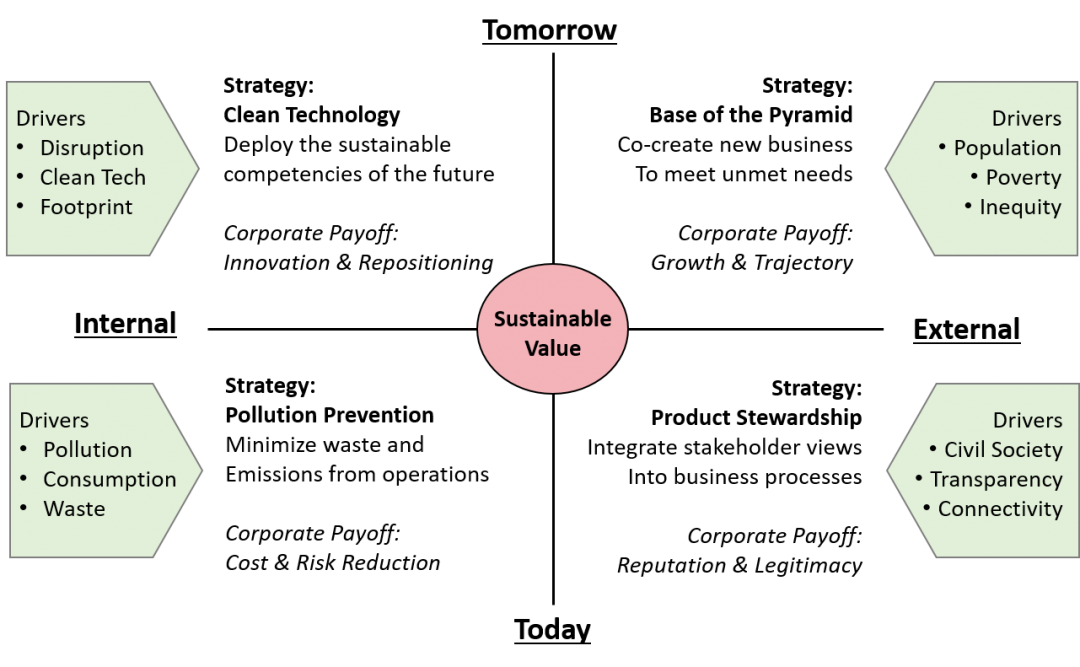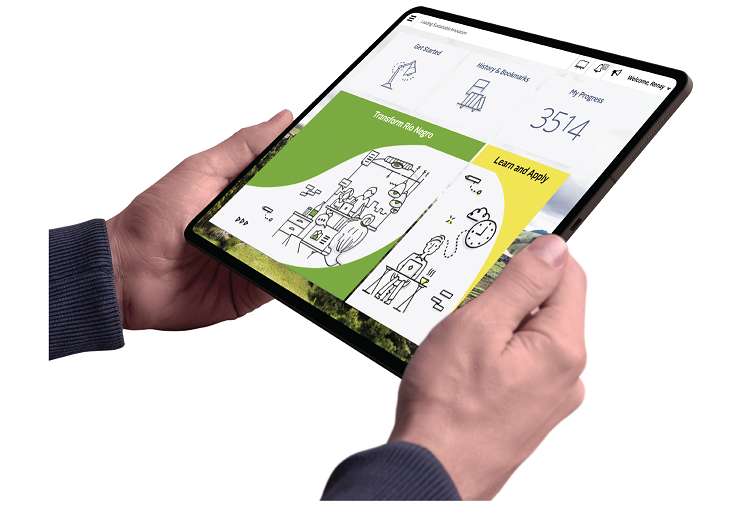Making – not finding – careers in sustainability: Reskilling leaders for a sustainable future
For nearly 25 years, WholeWorks has built and deployed simulation-based leadership development programs for multi-national corporations, to help them imagine their futures and accelerate the abilities of their leaders throughout the company to deliver on it. Today, that same approach is now available broadly in ‘Leading the Sustainability Transformation’ Professional Certificate Program, where they help professionals from companies around the world to discover new ways of doing business and cultivate their business acumen, strategic agility, whole-systems thinking, and leadership skills, enabling them to lead the sustainability transformation in their businesses, their industries, and their communities. Their simulation expertise also helps companies and organizations to re-imagine their futures through custom engagements and consulting. https://www.wholeworks.com/
I’m sitting in a Net Impact board meeting in June 2014. We’re at the Campbell Soup Company, hosted by fellow board member and Campbell’s CSO Dave Stangis, and we are talking about how best to equip and encourage emerging leaders for a more just and sustainable world. The thing that we keep observing is the propensity for intelligent, well-educated, enthusiastic, purpose-driven emerging leaders to ‘run into walls’ as they take on their first professional roles in companies, intent on the triple bottom line. These experiences leave some of them reeling and asking the question, “How do I find a job in sustainability?”
Wrong question.
“How do I make my job about sustainability.” That’s the question.
And it’s not a question that only new graduates should ask. It’s a question that all of us – leaders and professionals around the world – have the responsibility to ask.
Gaining the intellectual insight for leading sustainability
The Sustainable Value Framework, which Stuart Hart, Ph.D. developed and explained in his seminal work Capitalism at the Crossroads, provides a clear pathway for framing meaningful sustainability goals and strategies in any organization (see Exhibit below).
Hart starts where we all need to start – with reality. Business organizations are driven by the interests of their owners, the shareholders. Going back to fundamentals, he describes developing ‘Shareholder Value’ through a framework which considers a firm’s need to manage today’s business while simultaneously creating tomorrow’s technology and markets, and the need to nurture and protect internal organizational skills, technologies, and capabilities while simultaneously infusing the firm with new perspectives and knowledge from outside stakeholders. To be successful, all firms must manage these ongoing tensions and develop strategies that optimize the combination for owners' expected return on investment – reducing cost and risk, building reputation and legitimacy, developing new innovative technologies and capabilities, and creating new paths for growth. This is not new.
What’s new is to consider the same framework to address the challenges associated with sustainable development, the demand for which is business’ new reality (although some leaders see it faster than others). This requires that leaders and professionals pause a moment and consider the new skills and capabilities required for the world as it is today.
To provide a usable framework to make this extension, Hart developed a Sustainable Value Framework that directly links the challenges of global sustainability to the creation of shareholder value by the firm. The framework shows how the global challenges associated with sustainability, viewed through the appropriate set of business lenses, can help to identify strategies and practices that contribute to a more sustainable world while simultaneously driving shareholder value.

These four ‘quadrants’ show four clear paths to achieve business value through sustainability, which is the key to moving sustainability from the periphery of the business (‘when we have enough time and money’) to a core business driver (‘we cannot be successful without it’).
Each quadrant makes an important, but different type of business argument, from reducing waste, and thus costs and risk ( in the lower left-hand corner) to creating inclusive markets to meet the world’s unserved population, for true sustainability (upper right-hand corner) – economically and environmentally, with equity.
It seems so logical, right?
But the intellectual argument, however compelling, rarely drives the collective action required, because we are also emotional beings. People fear. They are afraid to put at risk the traditional approach, which may well be generating the current rate of expected return, in reaching for something which promises greater, sustainable prosperity. A few brave pioneers have entered this arena, but not nearly the critical mass to make it ‘business as usual.’
Gaining the confidence to lead sustainability through practice via simulation
Leading businesses toward sustainability is one of the highest-stakes professions of our time. How can leaders and professionals gain the competence, confidence, and credibility to move forward? Practice!
Real confidence comes only with experience. For many years, pilots, military, police, and other professions whose learning failures were too risky and costly to consider, have used simulation-based training. That same type of training is now available to business and organizational leaders and experienced professionals. Simulation-based training allows them to learn the fundamentals of sustainable value creation; immediately apply them in a realistic context; receive the results in clear metrics across the triple bottom line; and learn and adjust strategies and resources accordingly.
This experience is at the heart of ‘Leading the Sustainability Transformation’ Professional Certificate Program, a completely virtual, part-time, 10-week program for leaders and professionals looking to integrate sustainability into their business, community, and industry. Developed and endorsed by leading experts in sustainable development, the program is specifically designed to build participants’ knowledge of business ecosystem thinking, finance, sustainability strategies, virtual collaboration, global teamwork, enterprise leadership, change management, and personal influence.
What makes the program unique is the multi-player, whole-system simulation: The Rio Negro (RNB) live case simulation. The fictional multi-national pulp and paper company ‘Paper Nation’ has set forth a challenge to their newest site, RNB, to become an exemplary site, in an industry rife with sustainability and business challenges. As a capital intensive, ‘heavy foot-print’ industry, the team must deal with carbon-based energy reliance, high water use, and process pollution, while also ensuring resilient infrastructure. With trees as the main input for their product, the team deals with the myriad issues of sustainable and regenerative agriculture and small holder farmers to ensure a reliable supply chain. Highly engineered manufacturing processes require a well-trained and highly engaged workforce in a region with limited educational opportunities. Customer and market needs are ever-changing (and becoming more circular), and shareholders continue to demand a competitive rate on their capital. The challenges – and opportunities – are real, and repeated across the dozens of industries from which participants come.

Participants take on specific roles within the company and work together to develop strategies, executing them over 20 ‘years’ (2 years per week) to achieve the 30 triple bottom line objectives –financial, environmental, social – laid out by Paper Nation’s CEO. The experience sharpens participants’ intellectual understanding of cause-and-effect in a complex business ecosystem and gain the emotional intelligence through the necessary collaboration required to achieve the desired results.
The simulation in not only limited, however, to the leaders and professionals ‘inside the fence line.’ This simulation also explicitly recognizes that firms can only thrive when the social and environmental ecosystems in which they live also thrive. Roles that represent both the public sector (the ‘Mayor’) and civil society (‘NGO Manager’) are also essential to spur insight and drive effective collaboration to deal with natural tensions of multiple stakeholders and meet multiple needs.
Wrapped around the simulation are self-study learning modules, designed in 15 minute increments to meet the needs of busy professionals, which cover the essentials of sustainable business and change leadership to drive transformation. Participants also immediately apply lessons learned to develop a specific project plan important to their individual organizations.
Learning the concepts is important to reskilling leaders and professionals – but practice is crucial. Collectively, we require the space to fail safely, learn from it, and thus become better able to lead the sustainability transformation in our organizations, our communities, our industries, and the world.
About ‘Leading the Sustainability Transformation’ Professional Certificate Program
‘Leading the Sustainability Transformation’ Professional Certificate Program is a completely virtual, part-time, 10-week program for leaders and professionals looking to integrate sustainability into their business, community, and industry. The program includes a multi-player, whole-system simulation, supported by self-study modules. Each participant also immediately applies insights gleaned, and week by week, develops a project for sustainability to meet the needs of their organization, guided by an experienced coach and facilitator.
The spring program runs April 19-June 27, 2021, with registration due by April 12.
The fall program runs September 13-November 21, 2021, with registration due by September 6.
For more information and registration: https://www.wholeworks-lst.com/affiliates
